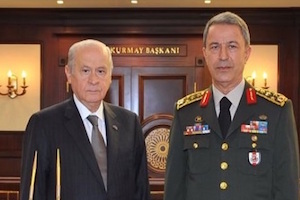Turkey's Emergency Election: The Primacy of Raison d'etat
By Halil Karaveli
May 2, 2018
It is not President Recep Tayyip Erdogan’s “power hunger” that accounts for Turkey’s snap presidential and general election. Instead, raison d’état is behind this event, which will enshrine presidential rule. The abolition of parliamentary rule and the concentration of all executive powers to the presidency are designed to neutralize the Kurdish challenge. It is also intended to refurbish the authority of the state and lend it a renewed aura of strength after it was torn apart by the Gülenists. Reactions to Turkish developments should not be based on interpretations that neglect the primacy of the state’s interests and the impact of the Gülenist threat and Kurdish challenge.

Post-Putsch Narratives and Turkey's Curious Coup
By Gareth H. Jenkins
July 22, 2016
Many of the details of the failed putsch in Turkey on July 15, 2016 still remain unclear. But, although it is possible that there was some form of involvement, there are problems with the narrative being peddled by the ruling Justice and Development Party (AKP) that it was a purely Gülenist affair. What is clear is that, driven by a combination of opportunism and fear, President Tayyip Erdoğan has seized on the putsch to launch a massive crackdown that could severely destabilize an already very fragile country.
Turkey is Yet to “Conquer” its History
By Halil Karaveli
June 6, 2016
The celebration of the conquest of Constantinople 1453 is an expression of Turkey’s quest for purity. The “ideology of conquest,” the need to symbolically and repeatedly reclaim what has been Ottoman and Turkish for centuries, ultimately speaks of an existential unease with a historical legacy that is marked by a heterogeneity that is unsettling for an authoritarian state that seeks uniformity. The need to celebrate the conquest of the most important city of the land shows that Turkey is yet to become reconciled with its past. Such reconciliation calls for assuming the entirety of what is a multi-layered historical legacy. Recognizing that Turkey is the result, not so much of conquest, as of a history of continuous mixing and assimilation of aboriginal cultures and state traditions, is also the key to coming to terms with country’s ethnic and cultural diversity today and securing a democratic future for Turkey.
The Sound of Footsteps: Erdogan’s New Enemies Within
By Gareth H. Jenkins
March 8, 2016
Former President Abdullah Gül’s recent decision to adopt a higher public profile and meet with known dissidents from inside the ruling Justice and Development Party (AKP) has triggered a flurry of speculation that his successor, President Recep Tayyip Erdoğan, may be about to face a serious challenge to his flailing attempts to tighten his grip on power.





